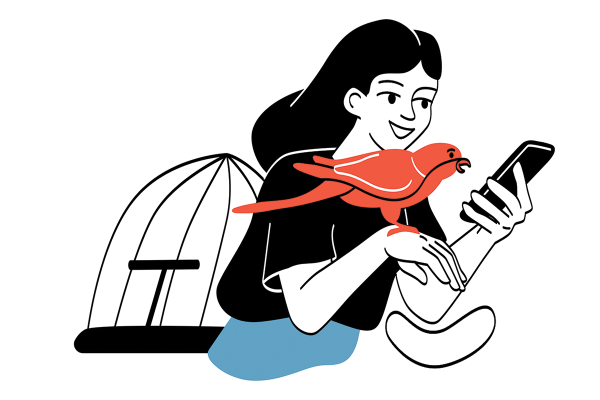WHEN I STEPPED off our back porch that June morning, some kerfuffle of squawks, feathers, and paws stopped me. There was Tom, our all-gray feral cat, slinking about. Then I made out some red streaks above — cardinals. I noticed Tom had something in his mouth. I cringed. Legs? Wings? Tail? Head? It was a baby bird. Its parents were hot on Tom’s trail.
Some sense of moral — my husband would say unnecessary — responsibility got hold of me. In that moment, I decided I was not going to let the cat I had brought into this backyard eat that bird, no matter how many birds he’d already nabbed. I yelled and chased Tom. And after I shamed the cat into dropping his prey under the trampoline, my 8-year-old son, Oliver, rescued the fledgling.
For the next 24 hours, I became a bird parent. We put the mottled brown bundle into a cardboard box on a ledge outside a second-floor window, away from prying cat paws. I must have sat by the window for hours that day, checking on the bird, looking up how to care for injured fledglings, digging some worms to try to feed it, and watching its parents fly in and out of the box and fuss over it.
The next morning it started raining. I put some rags in the box and covered it with a metal baking sheet. The baby bird still got drenched and moved less frequently, broken wing dangling. I realized it wouldn’t survive without some help. In the car to the wildlife rehab center, Oliver cried. “I’m glad the doctor will take care of it, but I’m sad it won’t see its parents again.” If it survived, the bird would be released into a nearby forest preserve, miles from our house.
That night, I looked at the soggy box on the ledge. Baby bird was gone. Devoted parents were gone, probably wondering what the humans had done to their offspring. Or maybe birds just move on?
A week later, I called the wildlife center. The baby bird didn’t make it. And — scandalously — it wasn’t even a cardinal. It was a brown-headed cowbird. Mothers of this species lay their eggs in other nests and the other birds often mistake the hatchlings as their own.
Six months later, the intimacy of those 24 hours with the family of another species still shimmers in my memory. I had never been so entwined in bird life before.
Was my introducing a predator cat into the backyard to catch mice just another part of nature, in the same way brown-headed cowbird females parasitize the parenting instincts of other birds? Probably not. Was my own instinct to help the fledgling misplaced, a refusal to let nature take its course? I don’t know. As a human, I struggle with where I belong in the world of other creatures. But that 24 hours was a gift, a brief window into deep involvement with another species. I’ll never look at birds the same way again.

Got something to say about what you're reading? We value your feedback!

